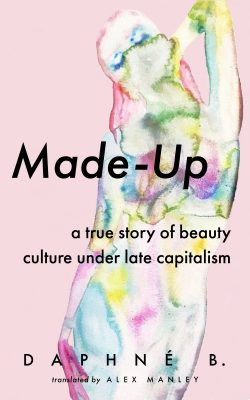Despite the huge popularity of makeup and beauty culture – subreddits about skincare, YouTube beauty influencers, not to mention the millions of dollars spent on the industry – consumers often have a difficult relationship to the culture, as it can conflict with our core values. Daphné B. captures this clash in her third book, Made-Up, in which she explores her relationship with beauty and makeup.
No, this isn’t a book about Daphné B.’s routine or favourite products (though she does talk about her purchases throughout her narration). Rather, she explores beauty as a whole, as a culture that she buys into on the regular through her consumption of YouTube videos, purchases from Sephora, and obsession with limited- edition palettes. Here she delivers a very raw narration that grabs the attention, and with good reason: what she writes about is something every millennial has experienced.

Made-Up
A True Story of Beauty Culture Under Late Capitalism
Daphné B.
Translated by Alex Manley
Coach House Books
$21.95
paper
160pp
9781552454299
She opens the book with an excerpt from Anne Boyer’s poem “No World But the World”:
The anarchist pop star had a baby with the son of a billionaire. It’s a little green-grey wad of cash and guns. Proof, for those who needed it, that she hadn’t really meant the things she’d said.
We can’t help but think of onetime Montrealer Grimes and her (newly past) relationship with Elon Musk. Explaining her relationship with poetry, she makes an interesting link between Boyer’s poetry and Grimes’ relationship with Musk, as if the poetry was a premonition (something Daphné B. says she used to believe in).
The core of the book is more than just pop culture references or the ease with which Daphné B. writes them. What comes off is how these elements influence our own lives. Daphné B. sets herself as an example: she obsesses over beauty and understands its influences. Close to an addiction, she continues consuming videos, one after the other, gripped by what is happening. She reflects on how influencers share their lives with their fans without any restraint, pulling them into their web of consumerism. Daphné B. analyzes and observes the phenomenon, while being an active participant. She reminds us of our own role in this culture, one in which we participate knowingly or not.
While the original essay was written in French, the English translation is seamless and flowing. Alex Manley’s translation keeps the authenticity of the original text. They understood the author’s intent and gave it its rightful voice in English. Manley’s translation doesn’t skip a beat, as if Made-Up was never written in any other language but English.
The real beauty in Made-Up and Daphné B.’s writing is how her experience is relatable to all of us. Is it very millennial? Yes, undoubtedly. Not everyone will get her references, and it won’t appeal to those who don’t understand the current beauty culture. That being said, it is an intelligent essay, punctuated with references to philosophy theories, literature, and pop culture. Daphné B. knows what she is writing about and acknowledges her own role in this mess of a universe. Made-Up makes us feel less alone in the very ugly world that is beauty culture.mRb






0 Comments